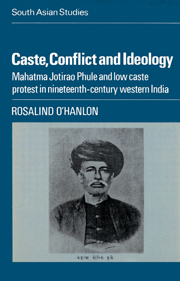 Caste, Conflict and Ideology
Caste, Conflict and Ideology from Part 3 - Jotirao Phule and his circle: the emergence of a distinctive radical voice
Published online by Cambridge University Press: 14 October 2009
Introduction: The Third Eye
Phule did not intend his distinctive focus upon Brahmans, and Brahmanic religion, as the ultimate cause of the deprivations of the lower castes to remain a matter of private disagreement between himself and his colleagues. In 1855, setting a pattern that he was to follow throughout his life, he described his position in detail in a polemical tract, a play entitled The Third Eye. In this play, he rejected decisively the view that the sufferings of the lower castes were the product of a social system supported by all except untouchable castes, whose own backwardness was a part of the problem.
The subject of the play was the exploitation of an ignorant and superstitious peasant couple by a cunning Brahman priest, and their subsequent enlightenment by a Christian missionary. It clearly set out the argument that Hindu religion represented both an ideological imposition upon the lower castes and, in its insistence on ritual and ceremony, a cause of their material impoverishment. At the same time, Phule made this issue much wider and more overtly political by relating it to some of the social effects of British rule. He was concerned in particular with the use of education and the skills of literacy as a vital social resource that conferred great power on Brahman social groups. They formed by far the largest proportion of those in the new vernacular schools and government English schools, and in the new administrative, educational, judicial, and revenue institutions of the Raj. The result was a virtual monopoly by Brahmans of the strategic position of administrative intermediaries between the British government and the masses of Hindu society.
To save this book to your Kindle, first ensure [email protected] is added to your Approved Personal Document E-mail List under your Personal Document Settings on the Manage Your Content and Devices page of your Amazon account. Then enter the ‘name’ part of your Kindle email address below. Find out more about saving to your Kindle.
Note you can select to save to either the @free.kindle.com or @kindle.com variations. ‘@free.kindle.com’ emails are free but can only be saved to your device when it is connected to wi-fi. ‘@kindle.com’ emails can be delivered even when you are not connected to wi-fi, but note that service fees apply.
Find out more about the Kindle Personal Document Service.
To save content items to your account, please confirm that you agree to abide by our usage policies. If this is the first time you use this feature, you will be asked to authorise Cambridge Core to connect with your account. Find out more about saving content to Dropbox.
To save content items to your account, please confirm that you agree to abide by our usage policies. If this is the first time you use this feature, you will be asked to authorise Cambridge Core to connect with your account. Find out more about saving content to Google Drive.